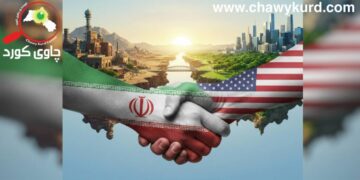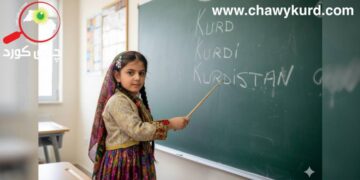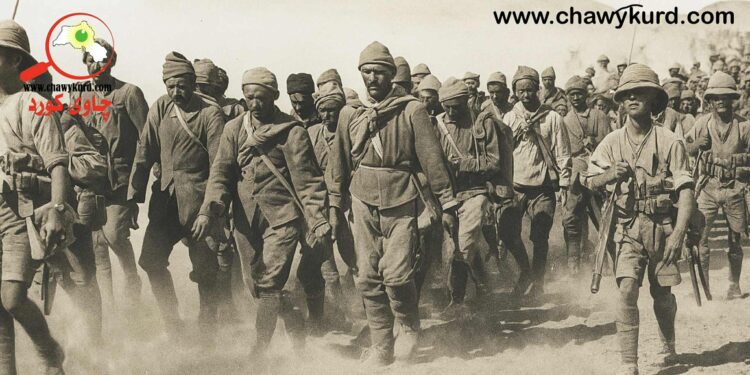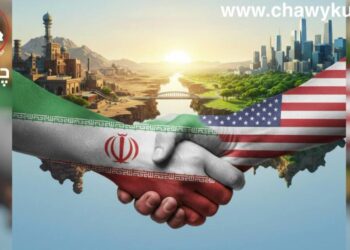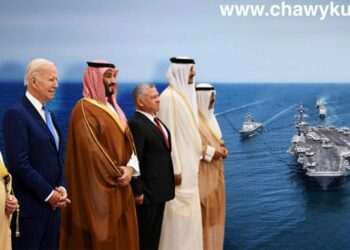Abstract
This paper analyzes how British war‐time diplomacy and postwar mandate policy contributed to the partition of “Greater Kurdistan” among four states—Turkey, Iraq, Syria, and Iran—between 1916 and 1926. Drawing on primary treaties and League of Nations proceedings alongside secondary scholarship, it argues that Britain’s shifting priorities—securing imperial communications, oil in Mosul, and inexpensive rule in Iraq—moved policy from tentative endorsement of Kurdish self-rule (in Sèvres) to acquiescence in borders that embedded Kurds as minorities. Britain was not the only actor shaping outcomes, but its choices at key junctures—Sykes–Picot (1916), Sèvres (1920), the Cairo Conference (1921), Lausanne (1923), and the Mosul decision (1925–26)—were decisive in institutionalizing the partition.
Introduction
“Greater Kurdistan” refers to the contiguous Kurdish-inhabited highlands spanning eastern Anatolia, northern Mesopotamia, and the Zagros foothills. At the First World War’s end, the collapse of the Ottoman Empire briefly opened space for non-Turkish and non-Arab national projects, including a Kurdish one. Britain emerged as the dominant power in Mesopotamia and a leading voice in the peace settlements. Its policy combined strategic aims (Suez–India communications), economic interests (particularly oil), and a desire to lower occupation costs by indirect rule. These goals shaped decisions that fragmented Kurdish space into distinct jurisdictions rather than enabling a unified Kurdish polity.
From Spheres to Possibilities: Sykes–Picot and Sèvres
The 1916 Sykes–Picot Agreement between Britain and France divided much of the Arab provinces of the Ottoman Empire into spheres of influence and sketched a British orientation toward Mesopotamia and the Persian Gulf. While not a Kurdish settlement, it prefigured a diplomatic habit of carving space with little regard for ethnographic continuities.
In 1920, the Treaty of Sèvres included Articles 62–64, envisioning a process toward Kurdish autonomy and the possibility—conditional on local consent and Allied approval—of an independent Kurdistan in eastern Anatolia. For many Kurds, Sèvres constituted a first international recognition of political rights. Yet these clauses were fragile, contingent, and embedded in a broader imperial settlement.
Reversal at Lausanne
The rise of the Turkish National Movement and the military reversal of Greece led the Allies to reopen the peace. At Lausanne (1922–23), with Lord Curzon leading the British delegation, the Allies dropped the Sèvres provisions on Kurdistan. The treaty recognized the sovereignty and borders of the new Republic of Turkey without Kurdish autonomy guarantees, while Turkey relinquished Arab provinces. This choice effectively nullified the Sèvres pathway for a Kurdish state and reoriented British aims toward stabilizing borders compatible with mandate governance.
Making Iraq and Managing the Kurds: The Cairo Conference and Air Control
Meanwhile in Mesopotamia, Britain built a cost-conscious imperial order. At the 1921 Cairo Conference, Winston Churchill sought to rationalize Middle East commitments by enthroning Faisal in Baghdad and shifting to “air control” as a cheaper mode of coercion and surveillance. The framework assumed incorporation of the Kurdish-majority Mosul vilayet within an Iraqi state under British tutelage, with Kurdish demands managed as an internal problem rather than as a separate self-determination file.
Air control—sustained RAF use of bombing to police revolt—became central to mandate practice in Iraq, including Kurdish regions. Debates over chemical agents occurred in Whitehall, though practical and legal constraints curtailed their use; conventional aerial bombardment was repeatedly employed to suppress uprisings.
The Mosul Question and the Brussels Line
The key territorial hinge for Kurdish partition was the disposition of Mosul. Turkey claimed Mosul on historical and strategic grounds; Britain insisted it belonged to its Iraqi mandate, pointing to administrative continuities, economic viability, and to the preferences of local populations as filtered through commissions of inquiry. In 1924, the League of Nations drew a provisional “Brussels Line,” and in 1925 the Council recommended awarding Mosul to Iraq; the decision was formalized in 1926 with a trilateral convention. This outcome set the northern boundary of Iraq and locked millions of Kurds into the Iraqi state. British advocacy—motivated in part by security and oil (the Turkish Petroleum Company)—was decisive in the diplomatic process.
Revolt, Co-optation, and the Foreclosure of a Unified Kurdistan
British tactics toward Kurdish politics in “Southern Kurdistan” blended co-optation and coercion. London initially experimented with devolved authority, appointing Sheikh Mahmud Barzanji as governor in Sulaymaniyah to counter both Ottoman/Turkish claims and local instability. His subsequent revolts (1919–1924) were crushed; brief Kurdish statehood claims in Sulaymaniyah (often styled the “Kingdom of Kurdistan”) failed to shift British commitment to an Iraqi framework. These episodes underscored that Britain would not sponsor a separate Kurdish polity west of the Iran border.
On the western flank, British understandings with France and the latter’s mandate in Syria entrenched another frontier that cut Kurdish regions between Iraq and Syria. The new Franco-British boundary (refined through inter-allied commissions and local arrangements) further fragmented Kurdish communities, aligning with imperial lines of communication rather than ethnographic continuities.
Mechanisms of Partition
Across these junctures, three mechanisms anchored the partition:
- Diplomatic substitution: Sèvres’ conditional promise for Kurds gave way to Lausanne’s silence, with British negotiators prioritizing a durable peace with Ankara over Kurdish autonomy.
- Mandate state-building: The Cairo-era decision to consolidate an Iraqi monarchy under British supervision assumed Mosul’s inclusion and categorized Kurdish claims as an internal minority issue.
- International adjudication: The League’s Mosul award to Iraq—strongly supported by Britain—converted a contested vilayet into an international border, precluding any contiguous Kurdish polity in the south and west.
Limits of British Agency
Britain did not act alone. Turkish military success made Sèvres untenable; French interests shaped Syria; and intra-Kurdish divisions and local elite rivalries complicated coherent diplomacy. Nonetheless, British choices mattered disproportionately because Britain controlled the mandate in Iraq, led Allied diplomacy, and possessed the leverage to trade Kurdish aspirations for other strategic gains. The archival and secondary record shows that when Kurdish autonomy clashed with the goals of cheap imperial order, oil security, and stable frontiers, London consistently chose the latter.
Consequences
By 1926, Kurdish lands were partitioned among Turkey (eastern Anatolia), Iraq (Mosul and adjacent districts), Syria (the Jazira and Afrin areas under French mandate), and Iran (where the international settlements had limited reach). Kurds became large minorities in each state, facing different regimes but sharing a common experience of constrained political expression. The long arc of Kurdish politics—from mid-century revolts to late-20th-century insurgencies and the emergence of the Kurdistan Region of Iraq—unfolded within boundaries that British policy helped to institutionalize a century earlier.
Britain’s role in partitioning Greater Kurdistan was neither an isolated conspiracy nor a mere accident of cartography. It was the cumulative effect of decisions taken at moments when London could have pressed for Kurdish autonomy but chose instead to stabilize a mandate system, cultivate Ankara, and secure Mosul. The combined impact of Sykes–Picot’s spheres, Lausanne’s retrenchment, the Cairo settlement of Iraq, and the League’s Mosul award produced a territorial order that divided Kurdish communities across four states—a pattern that still structures Middle Eastern politics today.
Winston Churchill’s Attitude Toward the Kurds
Winston Churchill’s position on Kurdish autonomy and statehood during the interwar period was complex and evolving. Initially sympathetic to Kurdish aspirations for autonomy, Churchill conceived a Kurdish buffer state as a strategic means to secure British interests. However, pragmatic considerations—oil, stability in Iraq, and shifting colonial strategy—led him to acquiesce in policies integrating Kurds into Iraq under British high commissioner oversight. This paper examines primary correspondence (Churchill–Cox), records from the 1921 Cairo Conference, and secondary scholarly analysis to trace Churchill’s changing stance and the factors that shaped it toward the eventual negation of a separate Kurdish entity.
During the collapse of the Ottoman Empire and the post–World War I reshaping of the Middle East, Kurdish territories became a subject of considerable British strategic interest. Winston Churchill, as Colonial Secretary, played a central role in early policy deliberations. His attitude evolved under competing influences: idealistic support for Kurdish autonomy, concerns for British imperial economy and defense, counsel from administrators such as Sir Percy Cox and Orientalists like Gertrude Bell, and larger geopolitical dynamics such as Turkey’s resurgence.
Early Sympathies and the Buffer-State Idea
Following World War I, Churchill exhibited a degree of sympathy toward Kurdish aspirations. At the 1921 Cairo Conference, a debate unfolded over whether to allow Kurds autonomy or incorporate them into a unified Iraq. Some attendees—including Churchill—favored the creation of a Kurdish buffer state between Iraq and Turkey, potentially reducing Kurdish sympathy for Turkish nationalism and protecting British strategic interests . A biographical analysis suggests that Churchill “favored a separate Kurdish state as a buffer zone between Iraq and Turkey” whereas Sir Percy Cox and Gertrude Bell opposed such a solution, preferring to integrate Kurdish areas into Iraq .
However, the concept of an independent Kurdistan remained tentative, and largely outweighed by realpolitik. As debates continued, Churchill’s initial sympathies met resistance from colonial administrators on the ground.
Correspondence with Percy Cox: The Turner of Tide
The correspondence between Churchill and Percy Cox (British High Commissioner in Iraq) between June and December 1921 further illuminates Churchill’s evolving thinking. Early letters show Churchill still open to a Kurdish arrangement with “local assent and special supervision by British Officers,” provided Kurds did not wish to be “put under Arabs” .
Yet, as Cox reported from the field, including the impracticalities and local divisions, and as Turkey regained strength, Churchill grew less inclined to support Kurdish autonomy. Cox argued for integration into Iraq due to fiscal and administrative feasibility. By late 1921, British policy had largely reversed: the “battie for Kurdistan” was lost, and Churchill no longer supported raising Kurdish rebellions or separate Kurdish governance outside the regions controlled by the mandate . In approving the removal of supporters of Kurdish revolt (e.g., Edward Noel) from Baghdad, Churchill marked a significant shift toward abandoning earlier autonomy inclinations .
Thus, Churchill’s initial attitude—welcoming some form of Kurdish distinct administrative status—gave way to a preference for integration, driven by strategic calculus and local counsel.
Strategic and Imperial Considerations
Multiple factors influenced Churchill’s final stance on the Kurds:
- Strategic Security: A buffer Kurdish state might deter Turkish encroachment but also risk foreign influence or instability.
- Fiscal Efficiency: Britain sought to minimize costs of imperial control, favoring indirect rule within Iraq, rather than supporting a new state.
- Administrative Practicality: Cox and Bell argued that no cohesive Kurdish leadership existed and that weaker tribal structures made autonomy infeasible.
- Oil and Resource Control: Mosul and surrounding Kurdish regions contained oil potential; keeping them within Iraq preserved economic advantages.
- Geopolitical Realism: With the rise of Turkish nationalism and fears of broader rebellion, Britain chose stability in Iraq over idealism for Kurdish nationhood.
These considerations collectively guided Churchill to favor integration of Kurdish regions into Iraq, administered under the British High Commissioner, with promises of limited autonomy rather than full sovereignty .
Consistency with Imperial Patterns
Churchill’s approach was emblematic of British colonial policy: balancing localized identities with imperial priorities. Initial gestures toward Kurdish autonomy paralleled similar early policies elsewhere but surrendered to the demands of state-building and resource control. His eventual siding with Cox and Bell showed trust in administrators’ local knowledge, and indicates how field reports could redirect metropolitan policy. This reflects broader trends: when minority nationalist demands conflicted with larger imperial imperatives (oil, border security, state formation), British policymakers often prioritized strategic integration.
Winston Churchill’s attitude toward the Kurds transitioned from cautious support for a separate Kurdish buffer zone toward acquiescence in their incorporation into Iraq under British oversight. Early recognition of Kurdish distinctiveness gave way to pragmatic acceptance of centralized control—reflecting shifting geopolitical realities, economic concerns, and administrative recommendations. Churchill’s evolving stance demonstrates the tension between imperial strategy and aspirations for minority nationhood, and the enduring imprint of these decisions continues to shape Kurdish politics.
The Beginnings of State Policies toward the Kurds in Turkey, Iran, Syria and Iraq after World War I
This paper examines the formative policies adopted by the emergent states of Turkey, Iran, Syria (French mandate) and Iraq (British mandate) toward Kurdish populations in the immediate post–World War I era (c. 1918–1930). Using primary treaty outcomes and established secondary literature, it traces how each government combined nation-building, security concerns, and administrative practice to incorporate, suppress, or marginalize Kurdish political expression. Although strategies differed in form—assimilation, military pacification, co-optation, or administrative partition—each state prioritized territorial integrity and centralization over Kurdish collective self-rule, setting patterns that shaped later Kurdish-state relations.
The breakup of the Ottoman Empire and the rearrangement of the Middle East after World War I created both opportunities and constraints for Kurdish political aspirations. Early international instruments—most notably the Treaty of Sèvres (1920), later superseded by the Treaty of Lausanne (1923)—offered, then removed, formal openings for Kurdish self-determination, while imperial mandates (British and French) and emergent national governments responded according to strategic, ideological, and administrative priorities. This study compares the initial policies adopted by Turkey, Iran, Syria (under French mandate), and Iraq (under British mandate) between 1918 and ca. 1930, focusing on four dimensions: legal/constitutional stance, security responses, administrative measures, and approaches to cultural/ethnic recognition.
Turkey: Denial, Assimilation and Military Consolidation
The Turkish national movement under Mustafa Kemal (Atatürk) treated the Kurdish question as part of a broader project of state-centered nation building. The Treaty of Lausanne (1923) established a unitary Turkish republic and recognized only non-Muslim minorities, effectively excluding Kurds from formal minority protections and signaling official denial of ethnic plurality within the Muslim polity. The republican leadership pursued policies emphasizing Turkification, centralized administration, and the suppression of separatist movements. Kurdish revolts in the early 1920s (notably the Sheikh Said rebellion, 1925) prompted forceful military responses, emergency laws, and population resettlement policies intended to break tribal and regional bases of resistance. These measures combined legal exclusion with coercive assimilation, reflecting the priority given to territorial integrity and cultural homogeneity in the early republican period.
Iran: Centralization under Pahlavi Modernization and Repression of Autonomous Claims
In Iran, the collapse of Qajar authority and the rise of Reza Khan/Pahlavi ambitions in the 1920s produced an assertive centralizing program that sought to transform a largely decentralized polity into a modern nation-state. Kurdish areas—concentrated in the northwest—were subjected to policies of military pacification and administrative integration. Tehran prioritized the suppression of local autonomy and tribal power, employing garrisons and punitive campaigns where needed and promoting Persianization in official institutions. Unlike later episodes (e.g., the Republic of Mahabad, 1946), the immediate post-WWI decade was marked by intermittent local revolts but increasing state capacity and intent to prevent emergence of Kurdish territorial claims or autonomous entities within the new centralized Iranian state.
Syria (French Mandate): Administrative Fragmentation and Instrumentalization
Under the French mandate (formally established at San Remo and implemented across the Levant), authorities pursued an approach that mixed administrative engineering with divide-and-rule tactics. In northeastern Syria (the Jazira and Afrin regions) the French initially encouraged settlement and agricultural development and sometimes tolerated Kurdish communal institutions as a counterweight to Arab nationalism. Yet the mandate settlement and later Franco-Syrian negotiations produced a Syrian territorial unit with no substantive provision for Kurdish autonomy; France preferred to secure its mandate by creating administratively workable units rather than fostering Kurdish nationhood. Kurdish political mobilization in Syria remained limited in the interwar years; French policies subordinated Kurdish claims to mandate priorities and inter-communal balances.
Iraq (British Mandate): Co-optation, Containment and the Mosul Settlement
British policy toward Kurds in Mesopotamia combined instrumental co-optation with coercive containment. At the Cairo Conference (1921) and during the mandate period, Britain prioritized creation of a consolidated Iraqi polity under a Hashemite monarchy that could be governed at low fiscal and military cost. In the north, Britain initially used local Kurdish leaders (e.g., Sheikh Mahmud Barzanji) as intermediaries but suppressed uprisings that threatened mandate order; when Mahmud declared a short-lived Kingdom of Kurdistan (1919–1924), British forces reasserted control and exiled leaders. The international disposition of the Mosul vilayet (League of Nations deliberations, mid-1920s)—awarded to Iraq—ensured that large Kurdish populations were absorbed into the Iraqi state rather than an independent Kurdish entity. Britain thus framed the Kurdish issue as an internal minority problem to be managed within mandate state structures.
Comparative Assessment and Common Patterns
Across these four polities, several shared features emerge. First, territorial integrity and centralization were the dominant state imperatives, typically overriding minority self-determination claims. Second, security-first responses—military pacification, emergency laws, and targeted resettlement—were common where Kurdish mobilization threatened state consolidation. Third, administrative choices (denial of minority status in Turkey, Persianization policies in Iran, mandate engineering in Syria, and incorporation under Iraqi governance) reflected differing institutional contexts but similar ends: containment of Kurdish political autonomy. Finally, external diplomacy (treaties, mandates, League adjudication) decisively reduced opportunities for a contiguous Kurdish polity, embedding Kurdish communities as minorities across four states.
Conclusion
The post–World War I decade set patterns that constrained Kurdish aspirations for self-rule. Whether through outright denial (Turkey), enforced centralization (Iran), administrative instrumentalization (French Syria), or managed incorporation (British Iraq), state actors privileged sovereignty and modernization over the accommodation of Kurdish nationhood. These early policies—legal exclusions, military pacification, and territorial adjudications—helped institutionalize a regional order in which Kurdish claims were marginalized, a legacy that continued to shape Kurdish–state relations throughout the twentieth century.
Resoruce
1-McDowall, D. (1996). A Modern History of the Kurds. London: I.B. Tauris.
2-Natali, D. (ed.). (2010). The Kurds and the State: Evolving National Identity in Iraq, Turkey, and Iran. Syracuse: Syracuse University Press.
3-Chatham House. (2005). The Kurdish Policy Imperative (Research Paper). London: Royal Institute of International Affairs.
4-“Kurds and Kurdish Nationalism in the Interwar Period,” in The Cambridge History of the Kurds, Cambridge University Press (chapter).
5-“The Sèvres Centennial: Self-Determination and the Kurds,” ASIL Insights (2020).
6-Encyclopaedia Iranica. “Iraq vi. Pahlavi Period, 1921–79.” (entry on regional Kurdish interactions).
7-Refugees, Labour and Sectarianism in Syria under the French Mandate, REMMM (OpenEdition), article on Jazira and refugee settlement.
8-Kilic, İ. (2018). Britain’s Kurdish Policy and Kurdistan 1918–1923 (MPhil thesis, University of East Anglia).
9-Washington Kurdish Institute / Kurdish sources on Treaty of Lausanne and Kurds (background summaries).
10-“The Kurdish Problem and the Mosul Boundary, 1918–1925,” quote from Churchill: “subject to proviso that Kurds are not to be put under Arabs if they do not wish to be.”
11-ProQuest article: Churchill–Cox correspondence, Churchill favored a Kurdish buffer state; by December 1921, British government no longer supported Kurdish rebellion.
12-“Early Kurdish nationalism” (Wikipedia summary of British policy): Churchill agreed with buffer state sentiment but later accepted Cox’s integration view.
13-International Churchill Society (Midwife to an “Ungrateful Volcano”): Churchill favored separate Kurdish state; Cox and Bell prevailed; region remained under British Civil Commissioner.
14-LSE blog (“toxic legacy”): Britain viewed Kurds as asset to integrate into Iraq; Oriental Secretary Bell and Churchill included Kurds to build Iraqi Sunni majority.
15-Wikipedia (Churchill’s policies): Churchill authorized suggestion of using “poison gas” against Kurdish insurgents, though not implemented.
16-Sykes–Picot Agreement (1916), text at Yale Avalon Project.
17-Treaty of Sèvres (1920), Articles 62–64 on Kurdistan (discussed in ETH Zurich Working Paper).
18-Treaty of Lausanne (1923), background and parties.
19-League of Nations, “Mosul Question” deliberations and outcome (1924–26).
20-McDowall, David. A Modern History of the Kurds. London: I.B. Tauris, 2004/2007.
21-Jwaideh, Wadie. The Kurdish National Movement: Its Origins and Development. Syracuse: Syracuse University Press, 2006.
22-ASIL Insight. “The Sèvres Centennial: Self-Determination and the Kurds.” (2020).
23-Washington Institute. The Lines that Bind: 100 Years of Sykes–Picot. Policy Focus 151. (2016).
24-Clio Visualizing History / Yale Univ. Press materials on the Cairo Conference (contextual overviews).
25-GlobalPolicy.org archive on the Mosul boundary dispute (historical overview).
26-Satia, Priya. “In Defense of Inhumanity: Air Control and the British Idea of Arabia,” and related works (as cited in secondary syntheses).27-UK RAF Centre for Air and Space Power Studies, historical reassessment (illustrative operational detail).” Mahmud Barzanji” and “Kingdom of Kurdistan” (baseline factual summaries; cross-check with monographs).






